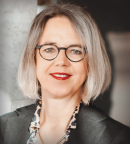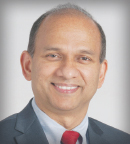For this installment of The ASCO Post’s Living a Full Life series, guest editor Jame Abraham, MD, FACP, spoke with Sibylle Loibl, MD, PhD, Chair of the German Breast Group (GBG) and Chief Executive Officer of the GBG Forschungs GmbH. Professor Loibl, Associate Professor of Obstetrics and Gynecology at the Goethe University of Frankfurt, gained international recognition for her research in neoadjuvant breast cancer, breast cancer during pregnancy, and breast cancer in young women.
Dr. Loibl was born and reared in a small town along the famous Romantic Road, a theme route in southern Germany linking several picturesque villages and castles, where she described her childhood as peaceful. As to her decision to pursue a career in medicine, Dr. Loibl explained: “When I was about 9 years old, we had a school play called the Caper and the Doctor, and I played the doctor. From that time on, I knew I wanted to become a doctor and never thought much of doing something else. But, of course, you never knew if you’d be accepted to medical school, which was very competitive, so you think, well, what could you do instead? But at the end of the day, I managed never to need to think about anything else.”
Sibylle Loibl, MD, PhD

On the intersection of oncology and gynecology: “Although it has changed slightly over the past 20 years in the German system, , when I began my career, the obstetrics and gynecologic services exclusively did breast cancer.”
On the German Breast Group: In 2023, the GBG will celebrate its 20th anniversary, and I was almost there from the very beginning. Funding trials is always a challenge, but we’ve persevered and, over the years, have been very successful.”
On choosing a career: “It’s important to have an idea of what you want to do; if you don’t have a precise direction, it’s important to open yourself up to experience new things and ask for advice and help.”
Germany’s Oldest University
After graduating from high school, Dr. Loibl entered the Universität Heidelberg, which was founded in 1386, making it the oldest university in Germany. Known as the Harvard of German medical schools, it is considered by many to be the nation’s most competitive school. Unlike in the United States, where there’s a two-stage process of undergraduate work before a 4-year medical school, Germany currently employs an integrated medical curriculum; it typically begins right after high school and consists of a 2-year preclinical segment of basic sciences and a 4-year clinical segment leading medical students to the practical aspects of medicine.
“I’m not in the position to say the Universität Heidelberg was the best, of course, because it’s my alma mater, but I had an incredible education there. It prepared me for a career in research and developing clinical trial protocols,” she said.
Asked about mentors who helped in her choice of specialty, Dr. Loibl replied: “Probably my most influential mentor was Prof. Heinrich Schmidt-Gayk, who helped with my doctor’s thesis; he unfortunately died of lymphoma a couple of years ago. He was instrumental and encouraged me to finish my project, but the title was not in obstetrics and gynecology. I only decided to do obstetrics and gynecology much later because it covers so many aspects. You have endocrinology and obstetrics. You have oncology and the standard gynecology. There’s a lot of different things you can do. It’s not really fixed. And, at that time, I wanted to do something that was broad. I didn’t want to do surgery or internal medicine, so I decided to go to obstetrics and gynecology. From the beginning, I liked obstetrics and oncology the most. At that time, Heidelberg was already famous for oncology clinical trials, so it gave my career an advantage from the start.”

A Different System
After attaining her medical degree, Dr. Loibl trained as a consultant in gynecology and obstetrics at the women’s clinics of the university hospitals in Heidelberg and Frankfurt am Main. Asked about the intersection of gynecology and oncology in the German medical system, Dr. Loibl responded: “Although it has changed slightly over the past 20 years in the German system, when I began my career, the obstetrics and gynecologic services exclusively did breast cancer. It was the advent of tamoxifen, so it was the start of the aromatase inhibitors. And then, there was AC [doxorubicin and cyclophosphamide] and CMF [cyclophosphamide, methotrexate, fluorouracil]. The first clinical trial I was involved in was the registration trial for docetaxel and the ZEBRA trial for GnRH analogs. So, there were not too many effective agents. My first trial as PI investigated the use of venlafaxene in treating patients with breast cancer with hot flushes. Gynecologists were doing breast-conserving surgery, which the surgeons didn’t care to do. And that’s how gynecologists in Germany evolved into breast cancer surgeons.”
Dr. Loibl continued: “I always wanted to work in a university hospital because I wanted to get a broad training and see everything in the field. I already wanted to go to the University Hospital in Heidelberg; on my first day there, I was asked what I wanted to do and said obstetrics and oncology. I saw so many oncology patients during my training who really suffered at that time because there was no cure. So, I wanted to do something for those poor patients, and that’s why I choose oncology and obstetrics. And probably that’s why I ended up in breast cancer doing work in pregnant patients with breast cancer because I could combine this research more easily.”
Dr. Loibl currently serves as Chair of the German Breast Group and Chief Executive Officer of the GBG Forschungs GmbH, where she established the Translational Research Group within the German Breast Group and has headed numerous research projects. She has also been involved in conducting and managing a significant number of national and international, practice-changing clinical trials.
“In 2023, the GBG will celebrate its 20th anniversary, and I was almost there from the very beginning. Of course, funding trials is always a challenge, but we’ve persevered and, over the years, have been very successful. I’m very excited about an emerging partnership between the GBG and the NSABP (National Surgical Adjuvant Breast and Bowel Project), as well as many other study groups in Europe, ie, the GEICAM (Spanish Research Group on Breast Cancer) and ABCSG (Austrian Breast & Colorectal Cancer Study Group), which will certainly help accelerate our global outreach efforts,” stated Dr. Loibl.
Making a Mark in Breast Cancer During Pregnancy
The incidence of breast cancer during pregnancy is about 1% to 3% of all breast cancers, which seems to be increasing with many women delaying childbearing into their 30s. Dr. Loibl has gained international recognition for her research in this difficult clinical scenario.
Asked to shed light on her work, Dr. Loibl replied: “It’s important to note that most pregnant women with breast cancer will receive chemotherapy. Our research has looked at, among other issues, how pregnant women with breast cancer cope while on chemotherapy, as the regimen is comparable to those in nonpregnant women. Also, taxanes can be given. We showed clearly that the newborns have a lower birth weight, which usually has no clinical implication. There were more events of the infants documented in the group who received chemotherapy during pregnancy, but still the majority was attributed to preterm deliveries. However, we must be careful because it is a registry, and events in the group of infants not exposed to chemotherapy might be underreported. Delaying chemotherapy can have an implication on survival, and the patient needs to be informed thoroughly and should be treated within an experienced multidisciplinary team.”
Guest Editor

Jame Abraham, MD, FACP
The Breast International Group
Dr. Loibl’s work in breast cancer has also led her to become an elected board member of the Breast International Group (BIG), which constitutes a network of more than 50 collaborative academic breast cancer research groups. Dr. Abraham asked Dr. Loibl to provide the readers of The ASCO Post an update on the future of BIG.
“BIG umbrella groups have always been well known for conducting large, academic-based registration trials with collaboration of the cooperative groups,” she began. “The name of BIG is closely linked to the large trials for HER2-positive early breast cancer (such as HERA), the most recent one being APHINITY, whose data led to the registration of pertuzumab. With GBG, I hope to successfully conduct similar studies in early-stage breast cancer leading to the registration and change of new treatments. The focus on specific populations will demand an organization such as BIG to achieve quick recruitment and collect high-quality data. Early-stage breast cancer, especially estrogen receptor–positive and triple-negative, is still far from being cured, whereas in general, early-stage HER2-positive breast cancer does seem curable now. The future focus here will lie in tailoring the treatment more specifically to the needs of patients and their tumor characteristics. However, de-escalation of therapy, as popular as it may seem, bears some risks.”
Dr. Loibl continued: “The breast cancer community, especially the collaboration of large cooperative groups, has achieved a lot in terms of longer and better survival of patients with breast cancer. This achievement should be maintained, and therefore de-escalation trials should be conducted only in specific groups of carefully selected patients.”
Words of Advice
Dr. Loibl offered some professional words of advice for those deciding on a career: “I think it’s important to have an idea of what you want to do in your career; if you don’t have a precise direction, it’s important to open yourself up to experience new things and ask for advice and help. I think many people don’t do that. There should be a continuous exchange of ideas and a feeling of exploration, which also entails having a dedicated research project. You also need to be willing to spend a lot of time in research; keep in mind that a paper is not written between 8:00 and 10:00 PM, so you need to dedicate time on weekends as well. A career in oncology is very demanding, and you need to be enthusiastic about your work. Get involved in clinical research and translational research. There are so many interesting possibilities in this field, but you must be open to change and be flexible enough to capture opportunities. Although oncology is highly challenging, there is no more rewarding career in all of medicine.”
How does a super-busy global oncology leader decompress? “My son always says that my work is my hobby,” shared Dr. Loibl. “But along with that, my husband is Indian, so I have a global perspective within the family, and he is very relaxing. Family and friends help to open your horizon. I sing in a choir, play piano, love going to the opera and reading, as well as enjoy time outside, walking and cycling. So, I’m always busy with activities that help achieve a healthy work-life balance.”
DISCLOSURE: Dr. Loibl has received speaker honoraria and/or advisory board fees paid to her instituion from AbbVie, Amgen, AstraZeneca, BMS, Celgene, DSI/Daiichi Sankyo, EirGenix, Gilead, GSK, Lilly, Merck, Novartis, Pfizer, Olema, Pierre Fabre, Relay Therapeutics, Roche, Sanofi, and SeaGen; institutional research grants from AstraZeneca, Celgene, Daiichi-Sankyo, Immunomedics/Gilead, Novartis, Pfizer, and Roche; institutional funding from AbbVie and Molecular Health; licensing Fees from VM Scope GmbH; nonfinancial support from AstraZeneca, Daiichi Sankyo, Immunomedics/Gilead, Novartis, Pfizer, Roche, and SeaGen; and is a full-time employee of GBG Forschungs GmbH.

